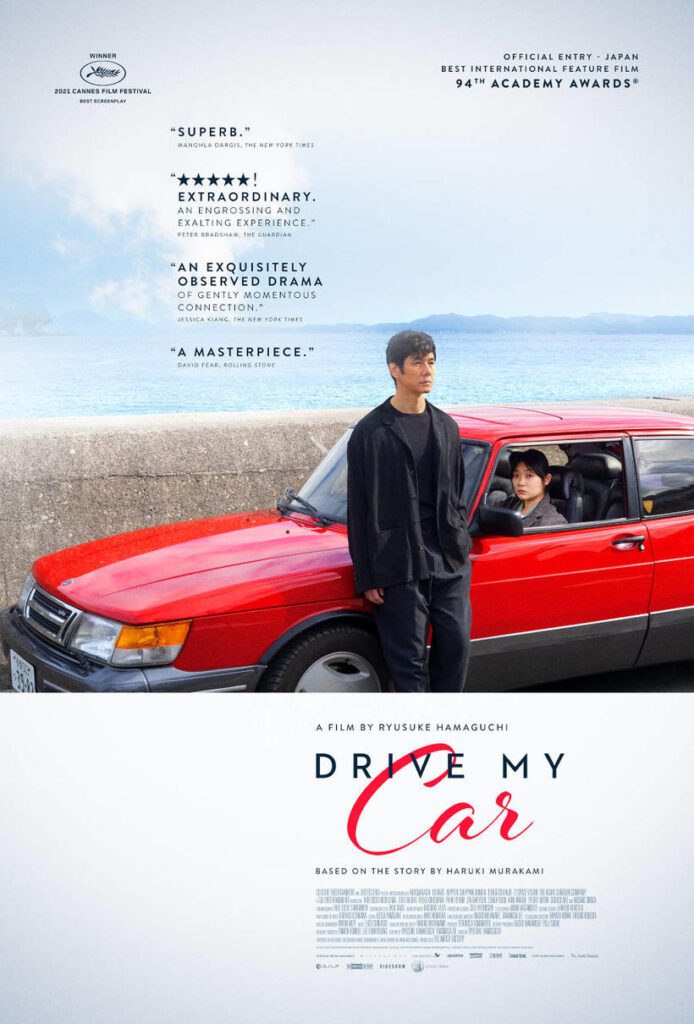
As the least-known contender in this year’s Oscar Best Picture nominees, Drive My Car has the best opportunity to surprise Western viewers unfamiliar with its story or cast. Thankfully, it takes full advantage of that opportunity, with director and co-screenwriter Ryusuke Hamaguchi somehow managing to turn a minor Haruki Murakami short story into a three-hour announcement that Japan is once again a force to be reckoned with on the international stage. Anchored by strong performances and exquisite pacing, the film is an absolute delight in spite of some bleak subject matter.
Yusuke and Oto Kafuku are a married couple entering middle age, with some wear evident on their faces but the kind of classic looks and style that make both of them still incredibly attractive. He’s a veteran stage actor and director, while she’s a writer for TV shows. Although they’re happy together, they carry the deep scars of losing their only child at a young age, trauma that has altered their lives together but never drove them apart.
When Yusuke (commonly referred to as Kafuku) walks in on Oto in the throes of passion with another man, he beats a hasty retreat rather than confronting them, then continues on with normal marital bliss without ever mentioning what he saw. Oto announces one morning that she wants to have a conversation with him that night, driving him to stay out later than normal out of dread. When he finally returns home, he’s shocked to find her dead on the floor, the victim of a surprise cerebral hemorrhage.
It’s jarring when opening credits roll around this point, nearly 40 minutes into the film, but it also signifies the vast departure the film is about to take, both from what has already transpired and also from the trajectory of Murakami’s original story. While there is a lot of driving ahead, it’s primarily in service to Kafuku’s new assignment as the director of a production of the classic play Uncle Vanya in Hiroshima. Therein lies the bulk of Hamaguchi’s expansion of the story, as the plot shifts into a study of the casting, rehearsal, and performance of the unique multilingual production, making much of the film feel more like an updated Vanya on 42nd Street than a road movie.
Hamaguchi exhibits a clear penchant for multinationalism here, rounding out the play’s mostly Japanese cast with oddities including a Taiwanese American woman named Janice Chang who performs in Mandarin and a mute Korean woman named Yoon-a who acts her lines entirely in Korean sign language. That makes for some confusing rehearsals, as Kafuku shifts between Japanese and English to convey his thoughts and relies on a translator to communicate with Yoon-a. Even scene partners are forced to rely on a scene’s feeling rather than their spoken interactions, resulting in a stunning audition scene between Janice and her Japanese partner (who Kafuku suspects was his wife’s lover) where they act in their native tongues but still generate a fiery exchange.
Aside from the rehearsals, there is a reason the film retains the title of the short story. Kafuku is assigned a mandatory driver by the Hiroshima festival, and he intentionally chooses lodging an hour away from rehearsal so he can run his lines as Uncle Vanya with a perfectly timed cassette tape of his deceased wife acting as his scene partner, so he’s in his car for extended time every day. His assigned driver is a rough, emotionless young woman who is initially all business but very, very slowly opens up to him to reveal her own familial trauma. She’s little more than a shadowy presence in the periphery until halfway through the film, making her emergence as the primary co-star in the final half all the more surprising. Not coincidentally, she’s the same age his deceased daughter would have been, with the pair clearly put on the road to becoming surrogate family members.
The cast is uniformly impressive, led by the stoic but perceptive Hidetoshi Nishijima as Kafuku in a winning performance that transcends his decades of primarily TV work. Toko Miura as the driver leans into the gruff, standoffish nature of her character just a bit too hard, but it works in the overall scheme of things. Reika Kirishima shines in her limited screen time as Oto, with knowing, world-weary glances conveying more than her lines. Park Yu-rim is spellbinding as Yoon-a, as we’re caught up in her quest to make her silent Korean voice heard in the Japanese play.
It’s worth noting that the original short story had nothing to do with Hiroshima, making Hamaguchi’s setting here feel like further reinforcement of the theme of deep-seated trauma, with his driving characters attempting to escape their past and heal just like their temporary hometown. The location is just one of many sure-footed choices Hamaguchi makes with this film, from his unwavering camera that allows his actors space to fully explore their characters, to his fascinating multinational take on Uncle Vanya, and his superb pacing that keeps the story moving better than most films half its length. While it’s a Japanese film, its international components and relatable scenarios make it feel like a product of the world.
Hamaguchi has proven to be willing to take massive risks with his art, tackling an adaptation of Andrei Tarkovsky’s imposing Solaris to start his feature film career and churning out a mammoth 5+ hour film in 2015 (Happy Hour) before altering and expanding the venerated work of Murakami here, so it’s particularly rewarding to see his latest tightrope act pay off with such growing acclaim and admiration. Drive My Car heralds the full arrival of a new master, with Hamaguchi steering this stunningly unique vehicle right into the annals of the all-time greats.